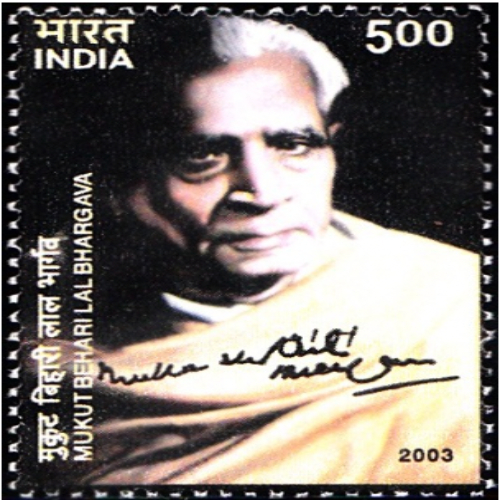Early life
Mukat Behari Lal Bhargava was born on 30 January 1903 in Rajasthan. He studied at Maharaja Middle High School, Shahpura and Mission High School, Beawar. He went on to complete his Masters degree in history at Muir Central College, Allahabad. After this, he pursued law at Allahabad University.
He began a law practice in at Bewar in 1927 and at the same time served as a member of the Bewar Municipality. He became the President of the Bar Association in Beawar and later was appointed as a Senior Advocate of the Supreme Court. He also served as the Chairman of the Rajasthan Bar Council.
Bhargava enjoyed swimming, reading and music. He was well-traveled and visited many countries like Switzerland, Austria, Germany, U.K., Paris, Italy as a representative of India at various international meetings.
Role in India’s Independence Movement
Bhargava joined the Indian National Congress in 1930 and participated in various movements. He was imprisoned for an individual ‘Satyagraha’ (1941) and again during the Quit India Movement (1942).
He was involved in many social movements including labour, farmer and harijan movements. He was a member of the Ajmer Provincial Harijan Sevak Samaj and the Ajmer Rajya Khadi and Village Industries Board. Bhargava also worked on women’s education and served as the Vice-President of the Mahila Siksha Sadan.
Contribution to Constitution Making
Bhargava was a representative of Ajmer in the Constituent Assembly. He participated in the discussions on the status of Chief Commissioner’s provinces (now known as Union Territories) in the Assembly.
Contributions Post-Independence
Bhargava continued to play an active political and administrative role post independence. He worked extensively for Ajmer as a member of the Chief Commissioner’s Advisory Council for Ajmer Merwara (1947—50). He was elected to the First (1952-57), Second (1957-1962) and Third Lok Sabha (1962-1967) from Ajmer on a Congress party ticket.
He represented India at various international fora including the 41st Inter-Parliamentary Conference at Berne (1952), the Second Session of the World Government Conference at London (1952) and the World Moral Rearmament Assembly at Caux (1952).
He passed away on 18 December 1980. The Government of India issued a stamp in his name to commemorate his exceptional work in 2003.
When the Draft Constitution was presented before the Assembly, he raised objections to the provisions on the Chief Commissioner’s provinces and was dismissive of retaining the administrative structure as enshrined in the Government of India Act, 1935.

